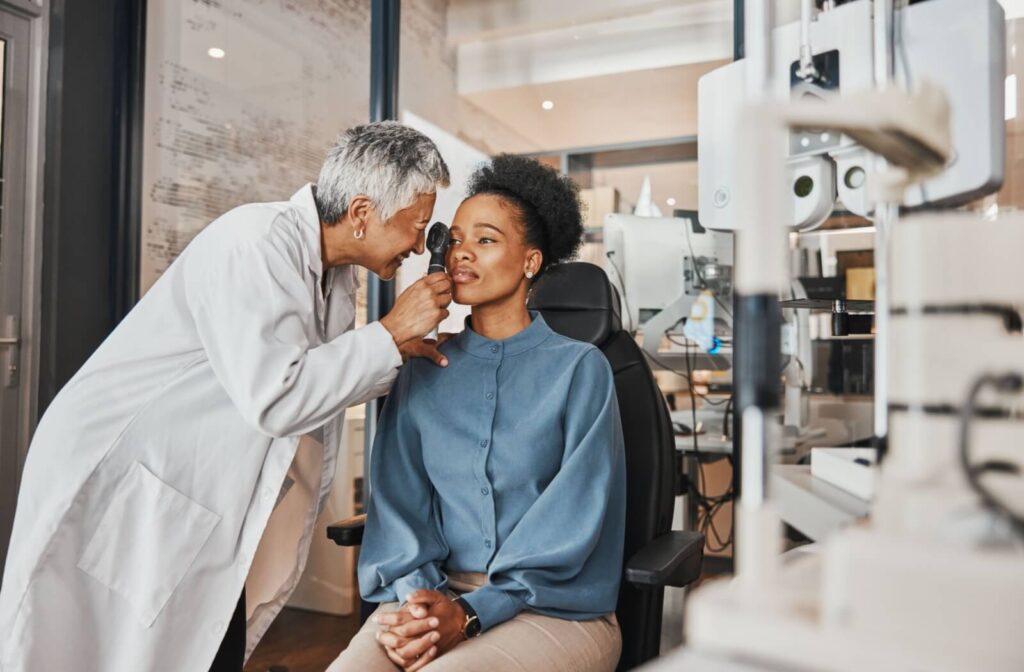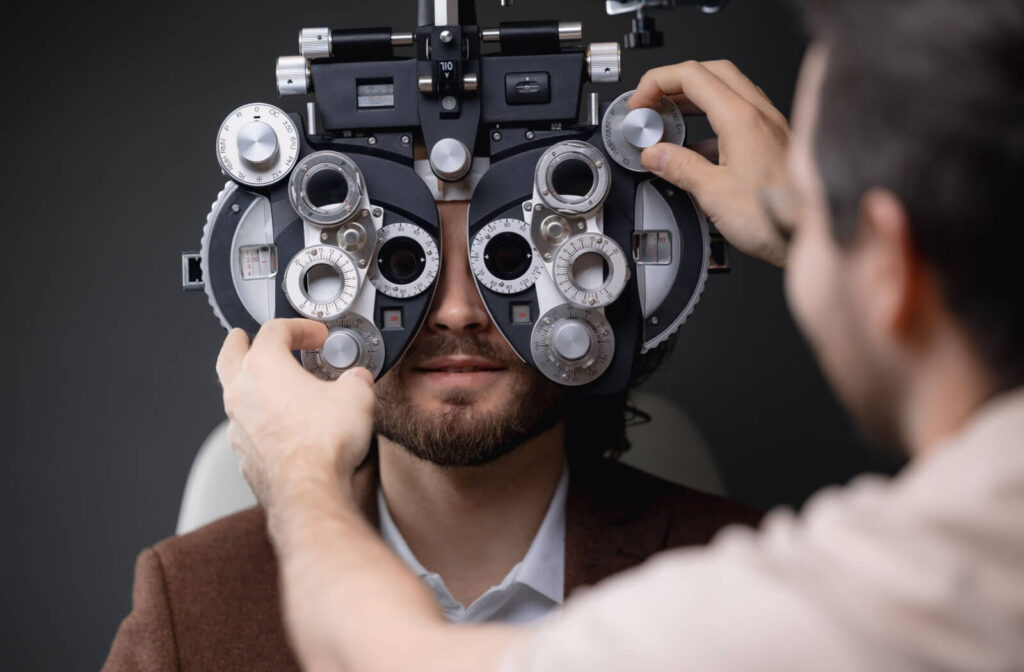We all want to do right by our health. But, as our days continue to become more chaotic, it’s hard for many of us to even make time for ourselves.
Booking an eye exam often comes with one burning question: how much time should I block out of my day? The answer isn’t as straightforward as you might expect. The duration of your visit will vary based on:
- The type of exam you need
- Your eye health and medical history
- Any concerns that you might have
Every case is different. Some people breeze through a routine exam in 30 minutes, while others might spend over an hour with their optometrist to address specific vision concerns or health conditions.
No matter how long your eye exam takes, what’s important is that you’re taking valuable time out of your day to invest in your health.
The Length of Your Eye Exam: Factors to Consider
Your age, health history, and the reason for your visit all play important roles in shaping your experience.
Your Current Eye Health Status
Patients with existing eye conditions like glaucoma, diabetic retinopathy, or macular degeneration typically require more comprehensive testing. These conditions need careful monitoring through specialized equipment and detailed examinations that take additional time.
Type of Exam Needed
It might surprise you, but there are actually different types of eye exams. Contact lens fittings, pre-surgical consultations, and diabetic eye exams each have their own tests, areas of focus, and consequently, their own time requirements.
Age & Risk Factors
Children’s eye exams often take longer. They might feel overwhelmed or have difficulty focusing, which requires us to take a unique approach to standard vision screening to get an accurate prescription.
Very young children might not be familiar with their ABCs, which is totally fine! We can still assess their visual development without a traditional eye chart. Children’s exams focus on eye alignment, tracking ability, and overall eye health using child-friendly methods.
Similarly, adults over 60 may need additional screenings for age-related conditions, extending the length of their appointment.
Routine Eye Exams: The Standard Timeline
A comprehensive eye exam typically takes 30 minutes from start to finish.
During this visit, your eye doctor will start by asking about your medical history and any vision problems you may be experiencing. This is a great time to share if you’ve noticed blurry vision, trouble seeing at night, or any discomfort with your eyes.
After that, they’ll perform a series of tests to evaluate different aspects of your vision and overall eye health, including:
- Visual Acuity Test: This is where you’ll read letters from a chart to check how sharp your vision is and see whether you need an updated vision prescription.
- Refraction Exam: Your eye doctor uses a series of lens options to find your accurate vision prescription.
- Eye Movement & Coordination: Your optometrist evaluates how well your eyes work together.
- Eye Health Evaluation: Your eye doctor closely examines the structures of your eye—from front to back—to look for any potential issues using a slit lamp, ophthalmoscope, and retinal imaging.
If everything looks good and there aren’t any red flags, you’ll receive an updated glasses prescription (if necessary), and you’re usually good to go within half an hour!

Contact Lens Exams
If you’re thinking about getting contact lenses, or if you already wear them and need to update your prescription to replenish your supply (a contact lens prescription is only valid for one year), you’ll need a contact lens exam.
This exam builds on your routine eye exam and requires additional testing. It’s often better known as a contact lens fitting. Here’s what you can expect:
- Initial measurements and fitting
- Trial lens insertion and vision testing
- Proper contact lens care and handling
This can add about 15 to 30 minutes to your appointment, depending on how familiar you are with contact lenses.
Eye Disease Monitoring & Screening
Certain health conditions require specialty eye exams that extend well beyond routine vision checks. These medical eye exams are important for early detection and management of serious eye diseases.
Diabetic Eye Exams
Diabetic eye exams focus on screening for any changes that might stem from diabetes. This general health condition affects blood sugar levels in the body, which can affect the eye’s delicate blood vessels.
These exams include pupil dilatation, optical coherence tomography (OCT) imaging, and fundus photos to document and monitor any abnormal changes in the retina or blood vessels.
Diabetes-related eye conditions can develop silently, often without noticeable symptoms until the condition progresses. Without timely interventions, this can pose a serious risk to your vision and overall eye health, which is why people with type 1 or type 2 diabetes should have an annual diabetic eye exam.
This screening can take 45 minutes to an hour.
Glaucoma Testing
Glaucoma screenings build on diabetic eye exams. Your dilated pupils make it easier to detect even subtle changes to your eye health. Besides, having diabetes increases the likelihood of developing glaucoma, a condition that also develops silently until the damage progresses.
This screening focuses on examining the optic nerve (through retinal imaging), evaluating peripheral vision (through visual field tests), and measuring eye pressure (a risk factor for glaucoma), which can take about 60 minutes.
Age-Related Eye Disease Screening
Patients over 60 or those with a family history of eye disease may undergo additional screening tests. This helps detect macular degeneration, cataracts, and other age-related conditions in their earliest stages.
Make the Time to Invest In Your Eye Health
If you’re coming in for a routine check-up, expect to spend about 30 minutes at the clinic. If you need specialized testing or are exploring options like contact lenses, give yourself a little more time. The most important thing is that your eyes are getting the care and attention they deserve.
Whether it’s a quick check-up or a more detailed screening, The Eye Care Team is here to guide you every step of the way. Regular eye exams are a key part of keeping your eyes healthy, so don’t hesitate to book an appointment with us today!



